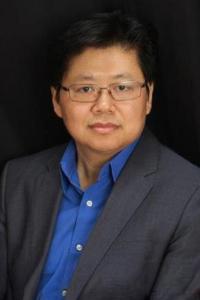Wei Gu, PhD
- Abraham and Mildred Goldstein Professor of Pathology and Cell Biology (in the Institute for Cancer Genetics)

Overview
Academic Appointments
- Abraham and Mildred Goldstein Professor of Pathology and Cell Biology (in the Institute for Cancer Genetics)
Research
Over the past 20 years, the integrative approach of the Gu Laboratory, combining biochemical analyses and advanced genetically manipulated mouse models has been instrumental to dissect the precise roles of protein modifications in regulating p53-mediated tumor suppression. The Gu lab has made significant contributions to establishing the roles of acetylation-mediated regulation of non-histone proteins. They established that site-specific acetylation plays a critical role in promoter-specific regulation of p53 targets. They discovered that the acidic domain containing proteins act as a new “reader” for acetylated substrates critically involved in acetylation-mediated actions. These studies have laid the foundation for the view that reversible acetylation is a general mechanism for regulation of non-histone proteins. Through in-depth investigation, the Gu lab has revealed that “dynamic ubiquitination” (polyubiquitination, monoubiquitination and deubiquitination) is the major mechanism by which the stability and subcellular localization of p53 protein are determined. They found that the deubiquitinase USP7 (also called HAUSP) interacts with both p53 and Mdm2; and is an important therapeutic target for human cancers through activating p53 and downregulating oncoproteins such as N-Myc. By using p53 acetylation-deficient mutant mice, the Gu lab has demonstrated that acetylation is required for p53-mediated cell-cycle arrest, senescence and apoptosis in vivo. Subsequently, they found that p53 is able to induce its tumor suppression through its metabolic targets including promoting ferroptosis.
Selected Publications
- Li T., Kon N., Jiang L., Tan M., Ludwig T., Zhao Y., Baer R., and Gu, W. (2012) Tumor suppression in the absence of p53-mediated cell cycle arrest, apoptosis, and senescence. Cell, 149, 1269-1283. PMC3688046
- Jiang L., Kon N., Li T., Wang S., Su T, Hibshoosh H., Baer R., and Gu W. (2015). Ferroptosis as a p53-mediated activity during tumor suppression. Nature. 520, 57-62. PMC4455927.
- Wang, D., Kon N., Lasso G., Jiang L, Leng W., Zhu W., Qin J., Honig B., and Gu, W. (2016) Acetylation-regulated interaction between p53 and SET reveals a widespread regulatory mode. Nature, 538, 118-122. PMC5333498
- Tavana O, Li D, Dai C, Lopez G, Banerjee D, Kon N, Chen C, Califano A, Yamashiro DJ, Sun H, Gu W. (2016) HAUSP deubiquitinates and stabilizes N-Myc in neuroblastoma. Nature Medicine. 10, 1180-1186. PMC5091299.
- Chu B, Kon N, Chen D, Li T, Liu T, Jiang L, Song S, Tavana O, Gu W. (2019) ALOX12 is required for p53-mediated tumor suppression through a distinct ferroptosis pathway. Nature Cell Biology. 21,579-531. PMC6624840.
- Stockwell BR, Jiang X, Gu W. (2020) Emerging Mechanisms and Disease Relevance of Ferroptosis. Trends Cell Biol. 30, 478-490. PMC7230071.
- Su Z, Kon N, Yi J, Zhao H, Zhang W, Tang Q, Li H, Kobayashi H, Li Z, Duan S, Liu Y, Olive KP, Zhang Z, Honig B, Manfredi JJ, Rustgi AK, Gu W. (2023) Specific regulation of BACH1 by the hotspot mutant p53(R175H) reveals a distinct gain-of-function mechanism. Nature Cancer. 4, 564-581. PMC10320414
- Yi J, Tavana O, Li H, Wang D, Baer RJ, Gu W.(2023). Targeting USP2 regulation of VPRBP-mediated degradation of p53 and PD-L1 for cancer therapy. Nature Commun. 14,1941. PMC10079682
- Yang X, Wang Z, Zandkarimi F, Liu Y, Duan S, Li Z, Kon N, Zhang Z, Jiang X, Stockwell BR, Gu W. (2023) Regulation of VKORC1L1 is critical for p53-mediated tumor suppression through vitamin K metabolism. Cell Metabolism 35,1474-1490. PMC10529626.
- Yang X, Wang Z, Samovich SN, Kapralov AA, Amoscato AA, Tyurin VA, Dar HH, Li Z, Duan S, Kon N, Chen D, Tycko B, Zhang Z, Jiang X, Bayir H, Stockwell BR, Kagan VE, Gu W. (2024) PHLDA2-mediated phosphatidic acid peroxidation triggers a distinct ferroptotic response during tumor suppression. Cell Metabolism. 36, 762-777.
For a complete list of publications, please visit PubMed.gov